|
|
|
Sort Order |
|
|
|
Items / Page
|
|
|
|
|
|
|
| Srl | Item |
| 1 |
ID:
103531
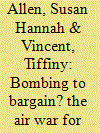

|
|
|
|
|
| Publication |
2011.
|
| Summary/Abstract |
Given the prominence of air power as a foreign policy tool, we attempt to clearly link the military process of dropping munitions on the target state to the accompanying diplomatic process between the attacker and the adversary. To explore the connection between the two processes, we look at the 1999 NATO bombing campaign over Kosovo, which allows us to isolate the influence of air power. Why were 78 days of NATO bombing needed to convince Miloševic to make concessions? Comparing expectations from both bargaining models and traditional coercive models, we find that the intensity of bombing, the duration of bombing, and mediation were important predictors of the Serbian government's behavior during the Kosovo crisis.
|
|
|
|
|
|
|
|
|
|
|
|
|
|
|
|
| 2 |
ID:
158991
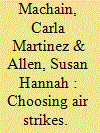

|
|
|
|
|
| Summary/Abstract |
Under what conditions do states choose to use only air power? Air strikes are one of many tools states use to promote their interests in the international system. Given that not all policy tools are appropriate for all crises, we explore when states choose to use air strikes as a coercive tool. We empirically test both common perceptions and newly derived hypotheses on the characteristics of states that employ air-only campaigns and the settings in which they do so, using newly collected data on the uses of air power during international crises between 1908 and 2006. Looking at the events that trigger the crises and the salience of the issues at stake, alongside the characteristics of the states involved, provides a clearer picture of when states use air power versus other coercive tools. Our research indicates that air-only campaigns are more likely to be initiated by militarily powerful states, but that in higher stakes crises, states are more likely to use ground troops or ground and air forces in combination.
|
|
|
|
|
|
|
|
|
|
|
|
|
|
|
|
| 3 |
ID:
084030
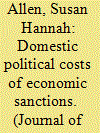

|
|
|
|
|
| Publication |
2008.
|
| Summary/Abstract |
While a great deal of attention has been to paid to whether or not economic sanctions work, less energy has been devoted to exploring the causal mechanisms that lead to the success or failure of sanctions policies. Often, it is assumed that the population is one important source of political costs for targeted leaders, but this assumption has not been tested. Are sanctions related to an increase in antigovernment activity? How does the domestic political system of the targeted state affect the likelihood of this antigovernment behavior? The findings presented here suggest that sanctions may increase antigovernment activity, but that increase is mitigated by the domestic political structures of the target state. In autocratic targets, political violence is less likely to occur when sanctions are in place. For sanctions against autocratic states to be costly, it appears that the political costs needed to alter behavior must be generated internationally rather than domestically.
|
|
|
|
|
|
|
|
|
|
|
|
|
|
|
|
| 4 |
ID:
162768


|
|
|
|
|
| Summary/Abstract |
How do domestic politics in the donor country affect foreign aid policy? Scholars have analyzed the impact that political parties and domestic institutions play in shaping aid effort. Building on this previous work, we examine the impact of domestic politics on the channels chosen for aid distribution. In this paper, we explore whether and how the ideological composition of donor governments affects the method of delivering aid to recipient states. Specifically, we argue that more liberal governments are more inclined to provide aid via nongovernmental organizations (NGOs), while more conservative governments prefer to give aid through direct bilateral government-to-government channels. These choices, we argue, reflect the different goals that right and left parties pursue through their allocation of foreign aid. Our results indicate that left governments are more inclined to channel aid through NGOs in an attempt to directly implement poverty alleviation strategies. Alternatively, right wing governments place a greater emphasis on channeling aid through recipient state governments to promote the economic interests of their constituents and the geopolitical interests of the state.
|
|
|
|
|
|
|
|
|
|
|
|
|
|
|
|
| 5 |
ID:
121794


|
|
|
|
|
| Publication |
2013.
|
| Summary/Abstract |
Economic sanctions have been referred to as a blunt instrument that the international community has often wielded without full consideration of the impact that these measures will have on the population of the targeted countries, particularly the weakest elements of society. Case studies of sanctions against Cuba, Iraq, and Yugoslavia have demonstrated the impact that sanctions can have on the availability of food, clean water, and medicine, causing many to conclude that all sanctions have extensive public health consequences. In this article, we examine the generalizability of these conclusions in a quantitative cross-national study of sanctions and their public health effects. Additionally, we compare these effects to those associated with both civil and interstate conflicts as critics have recently suggested that sanctions are not a humane alternative to armed warfare. We find that when sanctions have a large economic effect on the target they can have severe public health consequences. These consequences are substantively similar to those associated with major military conflicts. However, when sanctions have little or no economic effect on the target, they also have no substantive effect on public health. Building on recent work to explore the human consequences of war, this work also helps to demonstrate the importance of smart sanctions and humanitarian exemptions in sanctions policy.
|
|
|
|
|
|
|
|
|
|
|
|
|
|
|
|
| 6 |
ID:
082629
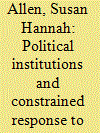

|
|
|
|
|
| Publication |
2008.
|
| Summary/Abstract |
Institutional constraints within the target state not only influence a leader's ability to resist economic sanctions, but they also affect the decision-making process within the target state and the nature of information that a sender can ascertain about likely response. Autocratic leaders, who are less constrained, send noisier signals about their probable behavior. This lack of constraint also allows more freedom to resist sanctions, as they can shunt the costs of sanctions off onto the general public, who have little influence over policy outcomes or leadership retention. Democratic leaders are more constrained and more susceptible to sanctions pressure. As result, there is less uncertainty for senders about probable response. Using a heteroskedastic probit model to explore potential systematic components of the variation surrounding sanctions response, the impact of sanctions is shown to differ by regime type-both in the response to coercion as well as in the variance surrounding that response. The results presented here suggest that as expected, democracies are more susceptible to sanctions pressure, but the response of mixed and authoritarian systems are more difficult to predict. These findings have implications for the design of future sanctions policy as well as suggesting which states make the best targets for economic coercion
|
|
|
|
|
|
|
|
|
|
|
|
|
|
|
|
| 7 |
ID:
134526
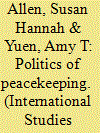

|
|
|
|
|
| Summary/Abstract |
Why are some peacekeeping mandates broad and expansive while others are narrow and well defined? Does variation in mandate flexibility reflect the needs inherent in resolving the conflict or the political interests of powerful states? The modern thread of debate surrounding UN action focuses on whether the political interests of the Permanent Five (P5) members in the Security Council or the stated goals of the institution as a whole drive UN behavior. While most analyses focus on where the UN intervenes to assess the political “pull” that member states exert on the institution, we examine variation in operational latitude across UN peacekeeping in war-torn states. Our analysis offers three main results. Powerful states do constrain international bureaucracies; however, bureaucratic independence varies with the intrinsic interests of the P5. Further, heterogeneity across powerful state preferences systematically affects bureaucratic flexibility in peacekeeping.
|
|
|
|
|
|
|
|
|
|
|
|
|
|
|
|
| 8 |
ID:
077070
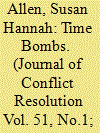

|
|
|
|
|
| Publication |
2007.
|
| Summary/Abstract |
Advancements in technology coupled with the perception of diminished public tolerance for casualties have increased the prominence and popularity of aerial bombing as a coercive tool, particularly for the United States. Despite interest from policy makers and support from the public, there has been little scholarly assessment of these coercive episodes. How successful are air campaigns, and what are the prospects for the future? In this article, I focus on the factors that cause bombing campaigns to end. To explore what leads to campaign termination, I highlight the theoretical significance of the political characteristics of both the attacker and the adversary. Using competing risks duration analysis to examine both failed and successful bombing campaigns from 1917 through 1999, I find that a democratic government on either side of the coercive equation increases the likelihood of campaigns ending
|
|
|
|
|
|
|
|
|
|
|
|
|
|
|
|
|
|
|
|
|